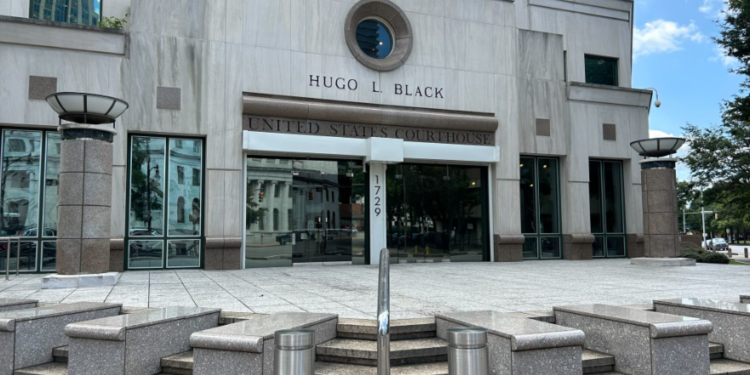May 29, 2025 Story by: Publisher
Alabama state officials told a federal court panel Wednesday that the state may delay drawing any new congressional district maps until 2030 in order to avert returning to federal oversight of its redistricting.
The Attorney General’s Office announced at a status hearing that legislative leaders would “voluntarily forgo any right to draw an additional congressional district map” as part of the remedial process. That move would effectively leave in place the court-ordered map with two districts that give Black voters a decisive say for the rest of the decade.
“We have been talking to the state about the possibility of perhaps resolving some or all of the remedial issues in this case, and that we would like the court to give us an opportunity to continue to have those discussions if they prove fruitful,” said Deuel Ross, an attorney with the NAACP Legal Defense Fund representing the plaintiffs, during the status conference.
Less than two hours before Wednesday’s hearing, attorneys for the state filed a court document stating that while they “maintain their arguments about the necessity and constitutionality of any remedial plan,” legislative leaders “will voluntarily forgo any rights that they may have to attempt to draw an additional congressional district map as part of remedial proceedings in this case.”
Senior Alabama attorney Jim Davis acknowledged on the record that the special master’s map (with two Black-opportunity districts) would stand as the final remedial map, and indicated that ongoing discussions with plaintiffs “could influence the briefing, possibly even resolve some issues”.
The announcement came as the same three-judge panel prepared to consider a request from plaintiffs to reinstate federal preclearance of Alabama’s maps – a requirement that has been dormant since Shelby County v. Holder (2013) – after finding that both the 2021 and 2023 legislative maps “intentionally discriminated” against Black voters.
“There have been a few discussions,” Davis said to the three-judge panel. “It’s possible that it could influence the briefing, possibly even resolve some issues.”
Alabama has had at least one majority-Black U.S. House district – the 7th – since 1992, but plaintiffs argued that it failed to give proper representation to Black Alabamians, who make up about 27% of the state’s population but, with a single majority-Black district, only made up 14% of Alabama’s U.S. House delegation. The three-judge panel struck down the 2021 map in 2022, ruling that racially polarized voting in Alabama meant that Black Alabamians could not select their preferred leaders.
“Either we’re going to sort of settle things and resolve this case, or we’re going to continue on with our request for preclearance in this,” Ross said in a phone interview after the status conference with the Alabama Reflector.
The court Wednesday also provided a hearing schedule for the preclearance issue if a settlement is not reached. The state would file its brief by June 16, and the plaintiffs would have until June 23 to respond. Intervening legislative defendants would have until June 27 to file a reply.
Voting Rights Act Background
Alabama was one of several states covered by Section 5 of the Voting Rights Act of 1965.
From its enactment until 2013, any changes to Alabama’s voting laws – including redistricting plans – required federal approval, either by the U.S. Justice Department or a D.C. federal court, before taking effect.
In Shelby County v. Holder (2013), however, the U.S. Supreme Court struck down the coverage formula that triggered Section 5 for Alabama and other jurisdictions.
The Court left Section 5 in place but effectively rendered it unenforceable absent a new formula. As the Justice Department explains, after Shelby “jurisdictions identified by the coverage formula in Section 4(b) no longer need to seek preclearance… unless they are covered by a separate court order entered under Section 3(c) of the Voting Rights Act”.
Section 3(c) of the VRA – allows a court to impose preclearance on a jurisdiction if it finds intentional discrimination in violation of the Fourteenth or Fifteenth Amendments. In that event, the court can require the jurisdiction to “submit for preapproval any voting qualification or prerequisite to voting or standard, practice, or procedure with respect to voting” for a time the court deems appropriate. Unlike the now-defunct Section 4 coverage formula, Section 3(c) has no expiration date.
Thus, plaintiffs in the Alabama case have asked the court to invoke Section 3(c) and force the state to get federal approval before making any new redistricting changes.
Recent Court Rulings and Allen v. Milligan
These federal issues arose from a lengthy legal challenge to Alabama’s congressional maps. In 2022, a three-judge federal court struck down Alabama’s 2021 map, ruling that it violated Section 2 of the Voting Rights Act by diluting Black voting power.
The court noted that Black Alabamians make up about 27% of the state’s population but under the old plan held only one of seven U.S. House seats (roughly 14% of representation). With voting patterns sharply polarized by race in Alabama, the court concluded that Black voters could not elect their preferred candidates in a second district under the 2021 plan.
The court ordered the state to draw a map with two districts in which Black voters would have a realistic opportunity to elect their chosen candidates.
The U.S. Supreme Court upheld that ruling.
In Allen v. Milligan, 599 U.S. U.S. ____ (2023), the Court agreed that plaintiffs were likely to prevail on their Section 2 claim against Alabama’s 2021 map. The Court’s 5-4 decision effectively mandated creation of a second majority-Black district.
In response, the Alabama legislature approved a new map in 2023 with one majority-Black district and a second district that was roughly 40% Black. The federal panel, however, still found that map intentionally discriminated against Black voters for failing to produce two Black-opportunity districts as required by law.
After trial, the three-judge court appointed a special master who drew a remedial map. That map shifted boundaries so that Alabama’s 2nd and 7th congressional districts are majority-Black or nearly so.
It was used in the 2024 elections, and the result was historic: for the first time, Alabama elected two Black members to the U.S. House simultaneously. Republicans won five other seats, as in prior years.
In its 2025 opinion, the panel explicitly found the 2023 legislative map was the product of racial intent, saying the Legislature had “purposefully refused” to comply with prior court orders.
Sources: Alabama Reflector / Shelby County v. Holder, 570 U.S. 529 / Allen v. Milligan, 599 U.S.

















